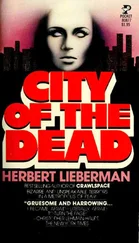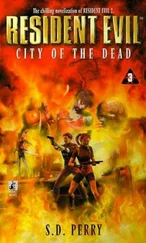Robert Sheckley - City of the Dead
Здесь есть возможность читать онлайн «Robert Sheckley - City of the Dead» весь текст электронной книги совершенно бесплатно (целиком полную версию без сокращений). В некоторых случаях можно слушать аудио, скачать через торрент в формате fb2 и присутствует краткое содержание. Жанр: Фэнтези, на английском языке. Описание произведения, (предисловие) а так же отзывы посетителей доступны на портале библиотеки ЛибКат.
- Название:City of the Dead
- Автор:
- Жанр:
- Год:неизвестен
- ISBN:нет данных
- Рейтинг книги:3 / 5. Голосов: 1
-
Избранное:Добавить в избранное
- Отзывы:
-
Ваша оценка:
- 60
- 1
- 2
- 3
- 4
- 5
City of the Dead: краткое содержание, описание и аннотация
Предлагаем к чтению аннотацию, описание, краткое содержание или предисловие (зависит от того, что написал сам автор книги «City of the Dead»). Если вы не нашли необходимую информацию о книге — напишите в комментариях, мы постараемся отыскать её.
City of the Dead — читать онлайн бесплатно полную книгу (весь текст) целиком
Ниже представлен текст книги, разбитый по страницам. Система сохранения места последней прочитанной страницы, позволяет с удобством читать онлайн бесплатно книгу «City of the Dead», без необходимости каждый раз заново искать на чём Вы остановились. Поставьте закладку, и сможете в любой момент перейти на страницу, на которой закончили чтение.
Интервал:
Закладка:
Tantulus is standing there in a muddy little pool on the banks of the Styx up to his chin in water. But each time he bends over to take a drink, the water recedes from him, leaving his face caked with black mud and him with the nickname given him by the Corybantes, Old Dirtymouth. No water for Tantulus. That's the first rule.
Next, from branches of the willow tree near which he is chained, from drooping branches hang great snack foods, whole pastramis, liverwursts, salamis of every size, sort and description, cheeses like the world has never seen, composed salads, beautifully cooked vegetables suspended in cobwebs, themselves edible.
But of course, you guessed it, when Tantulus tries to eat anything, the thing is pulled out of his hands and is always just out of his reach. So he's standing there up to the chin in water he can't drink surrounded by foods he can't eat and this is Zeus's idea of a really cruel punishment.
But in hell you get used to anything and if Tantulus couldn't drink the water, at least he could feel it, the feel of water lapping around his legs. They hadn't taken that away. Couldn't. What would be left if he couldn't feel the water he stood in?
The water was really feeling good this morning. Sometimes that happens even in hell. They try to gross you out, but sometimes they slip up. This was Tantulus at his best, trying to make the best of his lot. Inviting friends over for a banquet even if he couldn't eat it himself.
His guests came from far and wide. From all parts of hell. Soon they were all assembled. And then Tantulus addressed them.
"My friends," he said, "you will forgive me if I don't get out of the water just now. It's my whim to entertain you while standing chin-deep in this rather delicious flow."
The fact was, Tantulus had been in hell so long that he had been granted certain privileges. Like the right of bathing in any river of hell of his choosing. This morning it was the Lethe. Of all the rivers of Hell, this was his favorite. The gods had dug mud pits on the banks of all the rivers of hell, and planted willow trees there to carry the food, and Tantulus could stand in any mud-pit he wanted just as long as he gave the people who arrange this sort of thing a little advance notice so they could set everything up.
It had taken Tantulus quite a long time to talk Hades and the other gods into giving him free access to the rivers. After all, he had pointed out, I'm not trying to mitigate my sentence. It has been indeed pointed out that I am indeed doomed to stand until eternity with water up to my chin, and that's all very well, I accept that. But why shouldn't I have different waters and different views?"
At first nobody paid any attention to him. Then his case was finally heard by the Judges.
Rhadamanthus, chief god of the judges of the dead, had at first refused to listen to Tantulus' argument. "It's not traditional," he grumbled.
"No," Tantulus replied, "but there's no rule against it. What isn't forbidden is allowed."
Rhadamanthus, Minos and the other judge hadn't been interested in getting into it, certainly not at first. It looked like a lot of trouble and they had plenty of work on their hands. There was a lot to do back in those days. People were always dying and coming through from Earth, arriving at the great crossroads where the judges of the dead sat, showing up in droves, hundreds, thousands, and then millions. There was scarcely time to judge the tenth part of them. Their stories were in many ways remarkably similar.
Most of the souls waiting to be judged were clad in winding-sheets. Some still had their jaws bound with the graveyard bandages. A few had managed to bring money with them, and some of them had quite a lot of money, because although Charon demanded but a single obol, several of the more aristocratic families had stuffed several obols, or a shekel or two, or even an entire talent of silver into their mouths. It was better than looking cheap.
It is well-known that Charon, the boatman of the dead, demanded payment for ferrying dead souls to Hades-one obol, cash on the barrelhead. Since there are no pockets in shrouds, the dead used to carry their money down to hell in their mouths.
The reason for payment to Charon, and the whole subject of money in hell, forms an interesting and permissible side issue. There is no use for money in hell. You only need money for buying and selling, and earth's the place for that, not hell. Nothing's for sale in hell, and people down there get into a terrible mental condition due to atrophy of the buying gland. They say that no matter how long he lives in hell, a mortal never gets over the memory of the convenience stores of earth. There are none in hell, nor are there inconvenience stores, though it's an interesting idea. So, nothing to buy, but form was important.
Nevertheless, he refused to take people aboard except for money. The moneyless dead used to gather on the Styx's near shore and complain. It is a terrible thing, having to listen to the dead whine. They would stand or lie in the mud of the riverbank and cry to Charon, asking to be taken across anyhow, for free, consider it a public service. Charon would just glare at them and say, "No free rides, not even in hell!"
City of the Dead (Part III)
It became a scandal, the way the penniless dead were piling up on the earthside shore.
Charon was a stickler for form. He charged for the sake of form, not for the money. He had no use for people's obols. He had a great stack of them that he kept in his locker back in Styxville, in the boathouse where he brought his houseboat in for repairs from time to time and as occasion demanded. For there are dangers even to crossing the Styx and if you think dead is the last word dangerwise, that just shows you haven't seen what can go wrong after you're dead.
The famous people among the dead had no trouble getting across, whether they had money or not. No one was going to stop a famous courtesan like Lais of Corinth, or Sappho, who was said to be able to discourse more cleverly than Socrates. By the time Rome became a power, the custom of putting an obol in the mouth of the dead had fallen into abeyance, not least for the lack of obols that a bankrupt and discredited Greece no longer sent forth into the world. But the old obol-in-the-mouth construct still remained. But it didn't matter, no one was going to keep a Roman empress out of hell just because her tiny white teeth were not clenched over a copper coin.
It had taken Tantulus a while to get used to visits from Roman Empresses who hadn't even been gleams in their daddy's eyes back in his day. They came to visit him because he was one of the sights, and they asked him questions all respectful-like because Tantulus was one of the old ones, one of the first settlers, one of the original population of Hell, The First Damned, they called themselves, the world's first criminals,
Tantulus had seen a lot of changes going on over the years that he had been here. What the hell, he used to tell the new recruits who came to him for advice, it isn't so bad a place. You can get used to anything. Even hell. Maybe even especially hell. Because when the worst has befallen you, there really is nothing else to fear.
SISYPHUS
The camera swung into action again, forefront of the shockwave of recognition, speeding down long dusty corridors with the reflected light gleaming off them, and, in its ingratiating manner, stopped to point out that Tantulus had some old friends down here. Take Sisyphus, for example, and we cut to a big bald old guy with a beard, condemned to carry a boulder up the side of a steep mountain, then, when he reached the top, roll it back to the bottom again.
That was all right as far as it went. Trouble is, no one said how long he should keep on doing it. Sisyphus continued to roll his boulders down the mountainside long after his punishment ought to have been over, long past the time when he should have been released on his own recognizance.
Читать дальшеИнтервал:
Закладка:
Похожие книги на «City of the Dead»
Представляем Вашему вниманию похожие книги на «City of the Dead» списком для выбора. Мы отобрали схожую по названию и смыслу литературу в надежде предоставить читателям больше вариантов отыскать новые, интересные, ещё непрочитанные произведения.
Обсуждение, отзывы о книге «City of the Dead» и просто собственные мнения читателей. Оставьте ваши комментарии, напишите, что Вы думаете о произведении, его смысле или главных героях. Укажите что конкретно понравилось, а что нет, и почему Вы так считаете.





